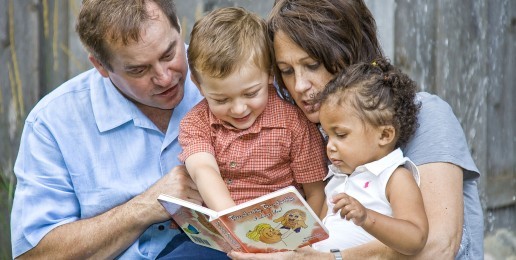
With each new generation of parents there comes a new generation of parenting books written by “experts” and “professionals” who purport to hold the key to successful parenting.
I can handle the onslaught of books and philosophies, but, personally, I bristle at the commercials with a young actor or actress extolling their parental virtue, “Talk to your child…he will listen,” reading their profound advice from a cue card. Whoever hired these people must consider the average parent to have the intelligence of a sack of hammers.
First of all, Hollywood is not exactly known for producing stable adults, let alone well-adjusted children. It’s as if they’re selling something, using their name and familiar face to persuade us to be good parents. If we are that shallow, our children need more help than a 60-second public service announcement can produce.
Notice you never see some plump, white-haired woman on a commercial saying with a smile, “I have raised eight children. Two are politicians, but the rest are happy, well-adjusted, successful adults. Here’s my advice…” Not even Dr. Phil can do that.
No, instead we get our advice from the stars. Lisa Whelchel, (she played Blair on “Facts of Life” years ago) authored a book entitled “Creative Correction: Extraordinary Ideas for Everyday Discipline.”
Parents don’t need creative correction; they need effective parenting skills and time to use them.
Unfortunately, due to the actions of a few, parents today live under a shadow of suspicion. Corporal punishment has been deemed child abuse by social workers and the nosy lady at the grocery store. No doubt, this is the conclusion of some “professional” who has only raised lab rats.
The problem with “professionals” who make these assessments is that they rarely have the opportunity to observe healthy, normal families. They tend to see only the families with problems and the extreme cases.
Then they draw conclusions and try to apply their theories to the rest of society, disregarding the methods of previous generations. Parents have used time-honored methods of discipline– not to harm their children, but to teach them and protect them from their own destructive childishness.
Raising children under the current politically correct system is like trying to raise chickens to live inside the house. When you strip parents of their respect and authority, you tie their hands behind their backs and leave them with only creative manipulation and bribery to coerce compliance.
A few years ago, I read about a desperate couple in Florida who went on strike to get their teenagers to help around the house. They pitched a tent, set up a lawn chair and TV, took the phone out to the driveway, and posted signs-“Parents on Strike.” Depriving teenagers of parental supervision–some plan.
I would be willing to bet this family lost that battle years ago when the children were still young enough to really care what their parents thought.
Reasoning with a young child who has not yet developed reasoning abilities can quickly digress into manipulation. Children, who learn manipulation (rather than respect) at an early age, become formidable foes as teenagers.
One “creative discipline” Ms. Whelchel advocates is placing hot sauce on a child’s tongue. My problem with this tactic is that it inflicts pain and possible injury for a minor offense.
Mouthy children or children who are trying on new words for size should be taught otherwise, but consequences coupled with an explanation on a child’s level works without danger of injury or the potential for abuse.
I prefer Grandma’s tradition. Give the small offender a chance to spit out any “dirty” words into the sink while explaining, “Those words are dirty, yuck. Get them out of your mouth.”
Then encouragement–“Spit! Keep spitting! Are they all out? Are you sure?” Always follow with a promise of help in the future.
“Okay, if I find anymore dirty words in there I will wash them out with soap for you.” A slightly soapy washcloth can quickly wipe out a budding new vocabulary.
Childishness is bound in the heart of a child, but it takes a diligent parent’s correction to drive it far from them.






















